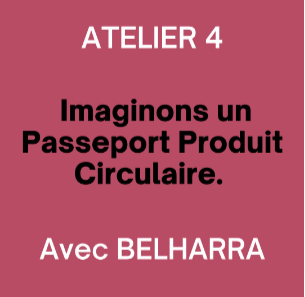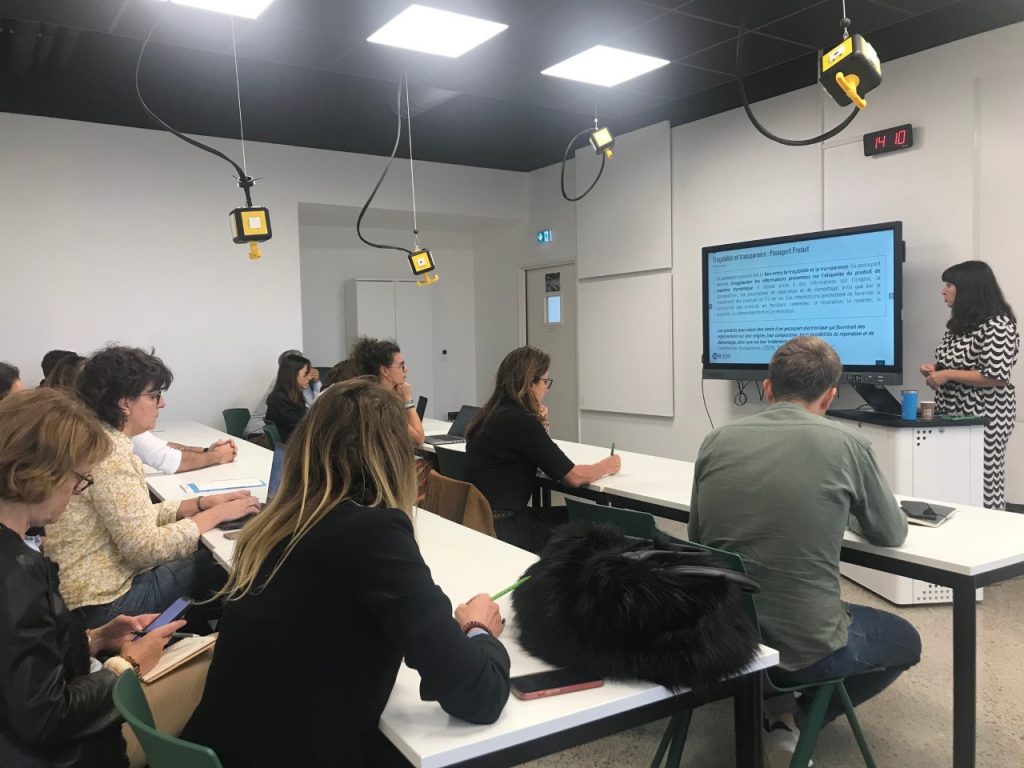
On October 20, as part of “ Biarritz Good Fashion ”, organized by the Bali Chair in partnership with Paris Good fashion, Belharra led a participatory workshop on the following theme: “let’s imagine a circular product passport. »
In collaboration with Dimitri Masson, Doctor in IT, teacher and research engineer at ESTIA, Pantxika Ospital, doctoral student at Belharra on the theme “Traceability & Transparency ”, presented to us the work carried out over more than a year:
The workshop brought together around fifteen representatives of brands, consulting firms and professionals, which opened up discussions and the sharing of points of view around 3 fundamental questions of which we present a summary.
To launch the discussions, Pantxika Ospital recalled the definition of the main concepts and repositioned the issues of the Digital Product Passport.
The Digital Product Passport creates the link between traceability and transparency . This passport allows the information presented on the product label to be increased dynamically . It provides access to information on the origin, composition, repair and dismantling possibilities, as well as the treatment of products at the end of their life. This information helps promote circularity by facilitating maintenance, repair, resale, rental, dismantling and recycling.

A major theme of the BALI Chair, traceability is at the heart of sustainable fashion issues. In partnership with PARIS GOOD FASHION and under the direction of BELHARRA Numérique , the CHAIRE provides a state of the art in traceability and transparency solutions . Find:
This document comes from the ongoing work of Pantxika Ospital and co-written with Bixente Demarcq , design engineer.
After a presentation of the Digital Product Passport promoting circularity, we collectively reflected on 3 questions which structured the discussions:
By centralizing product data, brands can better manage their production chain and also monitor their products after their sale. The use of PPN helps build customer loyalty by promoting their participation in a circular economy by offering an extended life to its products through repair, rental, resale and the possibility of more efficient recycling.
The information collected makes it possible to consolidate a database usable by different user profiles at different levels: at brand headquarters, in stores and after-sales for consumers and third parties (regulatory, trusted).
Depending on the users and the moments in the product's life, the information to be collected may concern the companies participating in the supply chain, the description of the products, the origin of the materials, and the different impacts: social, environmental and on health. Sharing a common standard on the data collected would allow better readability for the consumer and allow comparability of products with indices shared by the industry (sustainability, eco-design, recyclability). This augmented label accessible by a technological means durable over time is nevertheless limited to the lifespan of the labels and chips (QR code, NFC, RFID).


This Digital Product Passport promoting circularity must involve the consumer so that they can enter information relating to the after-sales life of the product. In compliance with the General Data Protection Regulation (GDPR), it is necessary to engage customers by creating a fun and educational user experience that strengthens the connection between consumers and the brand. The organization of events, co-creation workshops, and incentives create the opportunity for new exchanges.
The Circular Product is the culmination of the Digital Product Passport because it will allow brands to create a direct relationship with the consumer and user of their own products. It will then be possible to create a richer user experience
The Circular Product Passport will become essential for developing new economic models around a second-hand market, product rental or for recalling products in order to valorize materials through recycling, reuse or re-use.
It is obvious that the systematic generation of a Digital Product Passport for each product is a strategic issue and that control of traceability data is becoming central.
This is the whole challenge of the e-SCM and the innovation approach implemented for several years.